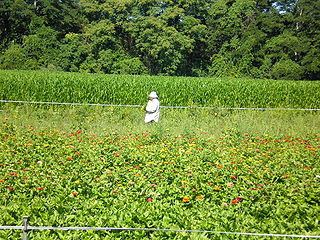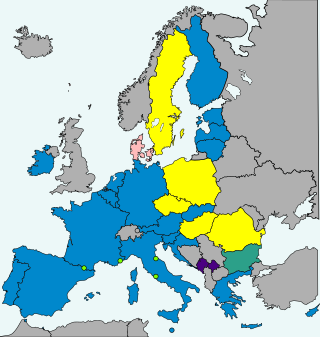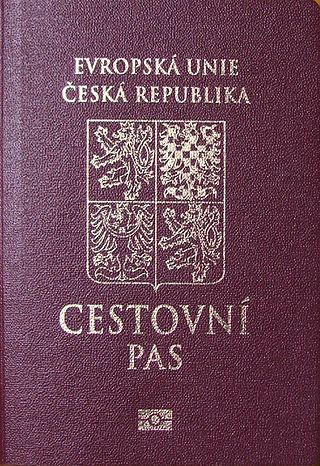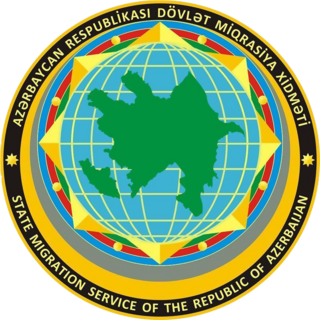Related Research Articles

The Czech Republic is a Central European country, a member of the European Union, the Organisation for Economic Co-operation and Development (OECD), Organization for Security and Co-operation in Europe (OSCE), the North Atlantic Treaty Organization (NATO), the United Nations. It entertains diplomatic relations with 191 countries of the world, around half of which maintain a resident embassy in the Czech capital city, Prague.

Mongolia has diplomatic relations with all 192 UN states, the Holy See, the State of Palestine and the European Union.

Foreign workers or guest workers are people who work in a country other than one of which they are a citizen. Some foreign workers use a guest worker program in a country with more preferred job prospects than in their home country. Guest workers are often either sent or invited to work outside their home country or have acquired a job before leaving their home country, whereas migrant workers often leave their home country without a specific job in prospect.
Since 1945, immigration to the United Kingdom, controlled by British immigration law and to an extent by British nationality law, has been significant, in particular from the Republic of Ireland and from the former British Empire, especially India, Bangladesh, Pakistan, the Caribbean, South Africa, Nigeria, Ghana, Kenya, and Hong Kong. Since the accession of the UK to the European Communities in the 1970s and the creation of the EU in the early 1990s, immigrants relocated from member states of the European Union, exercising one of the European Union's Four Freedoms. In 2021, since Brexit came into effect, previous EU citizenship's right to newly move to and reside in the UK on a permanent basis does not apply anymore. A smaller number have come as asylum seekers seeking protection as refugees under the United Nations 1951 Refugee Convention.

A migrant worker is a person who migrates within a home country or outside it to pursue work. Migrant workers usually do not have an intention to stay permanently in the country or region in which they work.

The Czech Republic is bound to adopt the euro in the future and to join the eurozone once it has satisfied the euro convergence criteria by the Treaty of Accession since it joined the European Union (EU) in 2004. The Czech Republic is therefore a candidate for the enlargement of the eurozone and it uses the Czech koruna as its currency, regulated by the Czech National Bank, a member of the European System of Central Banks, and does not participate in European Exchange Rate Mechanism II.

The Czech passport is an international travel document issued to nationals of the Czech Republic, and may also serve as proof of Czech citizenship. Besides enabling the bearer to travel internationally and serving as indication of Czech citizenship, the passport facilitates the process of securing assistance from Czech consular officials abroad or other European Union member states in case a Czech consular is absent, if needed.
African immigrants in Europe are individuals residing in Europe who were born in Africa. This includes both individuals born in North Africa and Sub-Saharan Africa.
Illegal immigration is the migration of people into a country in violation of that country's immigration laws, or the continuous residence in a country without the legal right to. Illegal immigration tends to be financially upward, from poorer to richer countries. Illegal residence in another country creates the risk of detention, deportation, and/or other persecutions.

Immigration to Turkey is the process by which people migrate to Turkey to reside in the country. Many, but not all, become Turkish citizens. After the dissolution of the Ottoman Empire and following Turkish War of Independence, an exodus by the large portion of Turkish (Turkic) and Muslim peoples from the Balkans, Caucasus, Crimea, and Greece took refuge in present-day Turkey and moulded the country's fundamental features. Trends of immigration towards Turkey continue to this day, although the motives are more varied and are usually in line with the patterns of global immigration movements. Turkey's migrant crisis is a following period since the 2010s, characterized by high numbers of people arriving and settling in Turkey.

Petra Hůlová is a Czech writer.
Mongolians in Taiwan form a small portion of the island's population. Labour migration from Mongolia to Taiwan began in 2004.

Czech Republic–Mongolia relations refer to the diplomatic relations between the Czech Republic and Mongolia. The Czech Republic has an embassy in Ulaanbaatar. Both nations are full members of the World Trade Organization and United Nations.

Immigration to Europe has a long history, but increased substantially after World War II. Western European countries, especially, saw high growth in immigration post 1945, and many European nations today have sizeable immigrant populations, both of European and non-European origin. In contemporary globalization, migrations to Europe have accelerated in speed and scale. Over the last decades, there has been an increase in negative attitudes towards immigration, and many studies have emphasized marked differences in the strength of anti-immigrant attitudes among European countries.

Czech Republic–Russia relations are the bilateral foreign relations between the Czech Republic and the Russian Federation. Relations have substantially deteriorated in recent years due to events such as the Russian annexation of Crimea in 2014, Russian sabotage of Czech ammunition depot in Vrbětice in 2014, poisoning of Sergei Skripal in 2018 and Russian invasion of Ukraine in 2022.

Canada and the Czech Republic maintain diplomatic relations. Canada has an embassy in Prague, while the Czech Republic has an embassy in Ottawa, a consulate general in Toronto and an honorary consulate in Calgary.
There are small number of resident Koreans in the Czech Republic, primarily citizens of South Korea.

In South Korea, immigration policy is handled by the immigration services of the Ministry of Justice, Ministry of Labor, Ministry of Health and Welfare and the Ministry of Foreign Affairs and Trade. The Nationality Act, Immigration Control Act, Multicultural Families Support Act, and the Framework Act on Treatment of Foreigners are the foundations of immigration policy in Korea. The Korean government initiated a discussion in 2003 on establishing an independent immigration office to accommodate fast-growing immigrant and to prepare inclusive and rational immigration policies; however, there has been little progress. The Foreigner Policy Committee, headed by the Prime Minister, coordinates foreigner-related policies which were handled by many ministries. However, its role is limited because of a shortage of resources and manpower. The establishment of an Immigration Office is expected to solve these problems by concentrating all related resources and manpower under one umbrella.

The State Migration Service of Azerbaijan Republic is a governmental agency within the Cabinet of Azerbaijan in charge of regulation of activities the sphere of migration taking in consideration issues of national security and stable social-economic and demographic development in Azerbaijan Republic. The committee is headed by Vusal Huseynov.
The migration and asylum policy of the European Union is within the area of freedom, security and justice, established to develop and harmonise principles and measures used by member countries of the European Union to regulate migration processes and to manage issues concerning asylum and refugee status in the European Union.
References
- ↑ 10 number of long-term residence holders - občané EU a občané třetích zemí v krajích ČR k 30. 06. 2020, Czech Statistical Office, 2011-12-31, retrieved 2014-01-10
- 1 2 G., Sainbayar (2006-07-05), "Mongolians in Prague Gathered", TV5 News, Ulaanbaatar, archived from the original on 2008-03-28, retrieved 2007-10-24
- ↑ Velinger, Jan (2007-03-17), "Right-wing extremists demonstrate in Blansko", Czech Radio International Service, archived from the original on 2008-03-28, retrieved 2007-10-24
- 1 2 "Charity supports Mongolians left without jobs, information", Prague Daily Monitor, 2009-03-10, retrieved 2009-05-19[ permanent dead link ]
- ↑ "Long Term residence (EU and Non-EU totals)", The Wall Street Journal, 2020-06-30, retrieved 2020-08-21
- ↑ 10 nejčastějších státních občanství cizinců: cizinci - občané EU a občané třetích zemí v krajích ČR k 31. 12. 2011 (PDF), Czech Statistical Office, 2011-12-31, retrieved 2014-01-10
- 1 2 "Latest numbers show 7,500 Mongolians working in Czech Republic", Mongolia Web, 2008-02-19, retrieved 2008-10-04
- 1 2 "Police detain Mongolian job brokers in raid in Prague", České Noviny, 2008-07-10, retrieved 2008-10-04
- ↑ "Czech Republic to seek foreign workers from Mongolia", Mongolia Web, 2007-06-12, retrieved 2008-10-04
- ↑ "Citing unemployment, Czech Republic closes doors to Mongolian workers", Mongolia Web, 2009-01-02, archived from the original on 2016-03-03, retrieved 2009-01-20
- 1 2 Perry, Joellen (2009-04-28), "The Czech Republic Pays for Immigrants to Go Home", The Wall Street Journal, retrieved 2009-04-29
- ↑ "Mongolian workers to be offered cash, free ride home from Czech Republic", Mongolia Web, 2009-02-06, retrieved 2009-02-13
- ↑ "LN: Mongolians to sue ČR over unaccessible work visa", Prague Monitor, 2011-05-24, archived from the original on 2014-01-10, retrieved 2012-03-08
- ↑ "Czech Republic: Plan for the implementation of the 2023 integration policy | European Website on Integration". migrant-integration.ec.europa.eu.
- ↑ Křížková, Martina (2009-03-06), "Good Mongolians - Who makes steering wheel covers in a small Czech town?", Migration Online, retrieved 2009-05-04
- ↑ Horakova, Pavla (2005-12-27), "Police: Number of illegal migrants on Slovak-Czech border drops", Czech Radio International Service, archived from the original on 2008-03-28, retrieved 2007-10-24
- ↑ "Program will seek to reduce illegal Mongolian workers in Czech Republic", Mongolia Web, 2008-04-30, retrieved 2008-10-04
- ↑ Jelínková, Marie (2009-02-06), "Mongolians dreaming their Czech dream: The long wait for visas - no guarantee of success", Migration Online, retrieved 2009-05-04
- ↑ Kristof, Nocholas (1990-03-16), "Upheaval in the East; New Mongolian Leadership Vows to Hold Free Election", The New York Times, retrieved 2007-10-24
- ↑ Vaughan, David (2007-01-14), "Petra Hulova: a rising star of the young generation of Czech writers", Czech Radio International Service, retrieved 2007-10-24